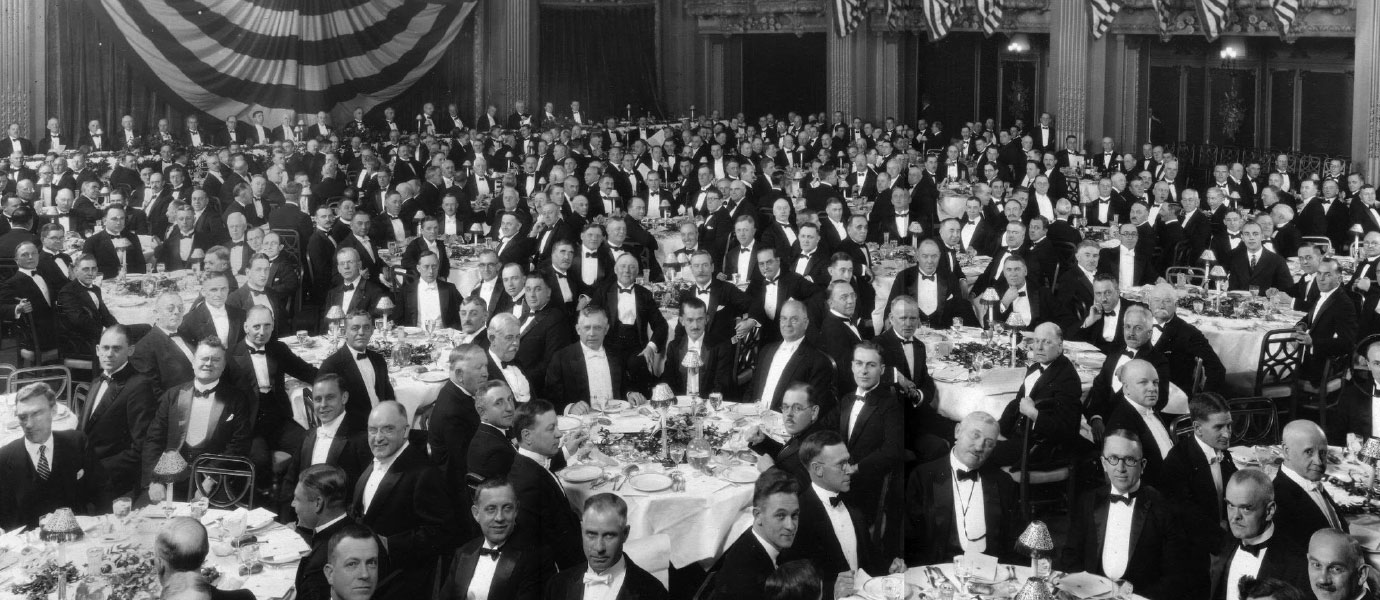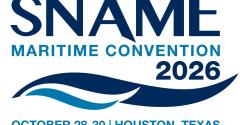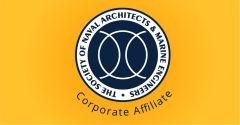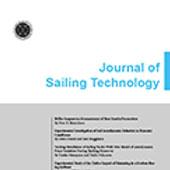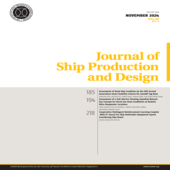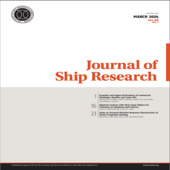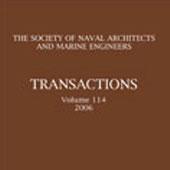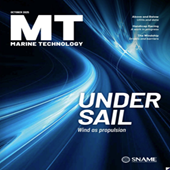Technical and research (T&R) | Bulletins and reports
A large number of ships powered by gas turbines and medium and slow speed diesel recover waste beat from exhaust gases and utilize the heat for power generation and miscellaneous ship’s service steam. On tankers, this waste recovery steam system is also used to heat hot water for tank cleaning and to provide for cargo heating. This system is often used in conjunction with oil-fired auxiliary boilers to provide steam for driving the cargo pumps. This bulletin describes some of the options available to the shipowner with respect to waste heat boiler types and system considerations.
T&R Bulletin 3-39 (2018) supersedes the existing T&R Bulletin 3-39 (1985).
This guide presents information for a shop and installation test of each type of equipment and system normally found on commercial ships. This Guide does not cover sea trial tests, which are covered in the current version of SNAME T&R Bulletin 3-47 (2015) Guide for Sea Trials (Progressive Speed, Maneuvering, and Endurance). References are made to applicable international standards.
Modern merchant ships have been distinguished by an increase in the features of automation which can reduce the level of manning. This trend towards increased control complexity and reduced shipboard personnel does demand a high degree of reliability in propulsion system controls, steering controls, and vital auxiliary shipboard systems. To assure the required reliability, the maintenance and testing of the machinery, electrical equipment, and controls has to be managed on a continuous, active basis.
T&R Bulletin 3-41 (1988) supersedes the existing T&R Bulletin 3-23 (1970).
The guide addresses the centralized control and automation of steam turbine propulsion plants. Included in the guide are discussions of: machinery operating stations; centralized operating requirements and equipment; and steam generating, propulsion, electrical, and auxiliary machinery control systems. The guide also addresses the control requirements of alternate fuels, combined firing, the application of advanced display and data transmission technologies, and regulatory requirements.
These guidelines present background, experience, and suggestions for implementing a vibration monitoring program for use in the maintenance of ship machinery. The use of systematic vibration measuring and recording in predictive and preventive maintenance of machinery is becoming common in land-based plants, has been used effectively by many ship operators, and is encouraged by the classification societies.
T&R Bulletin 3-43 (2016) supersedes the existing T&R Bulletin 3-43 (1987) and T&R Bulletin 3-10 (1961).
This document provides best-practice guidance on the installation and alignment of propulsion reduction gears in ships and smaller marine vehicles including the small craft of all power levels. The guidelines in this bulletin are written to address any type of vessel regardless of the type of prime mover or fuel source. This guide is intended to assist users in applying standards and to allow the vessel owner, designers, and builders to work together with gear designers and suppliers to achieve practical and successful installations. References are made to applicable standards with the focus on providing an understanding of the important elements to consider and how to best go about achieving successful installations with reliable lasting performance.
T&R Bulletin 3-47 (2015) supersedes the existing T&R Bulletin 3-47 (1989).
This guide covers progressive speed, maneuvering, and endurance sea trials of self-propelled surface ships displacing 300 tonnes or more, powered by hydrocarbon fuels such as petroleum, natural gas or biofuel, and driven by diesel or Otto-cycle engines, gas turbine, or electric motors. References are made to applicable international standards. This Bulletin does not cover dock trials, tests, or demonstrations that can be conducted dockside, which are covered in SNAME T&R Bulletin 3-39, Guide for Shop and Installation Tests. This Guide is intended to assist users in applying IMO maneuvering standards and to allow the owner, designer, and builder to rate the vessel’s maneuvering performance relative to statistical data of vessel maneuvering characteristics. The Guide summarizes the procedures to be used in assessing a vessel’s maneuvering performance.
This report presents the results of a SNAME panel evaluation cable splicing techniques and hardware for application to commercial and navy shipbuilding to support the concept of modular ship construction. The search was for less expensive materials and methods that could at least equal the integrity of the new cable. The various methods of splicing cables were evaluated for the many types of wiring and wiring installations available. The Panel recommendations are based on current technologies; prior studies and reports; performance testing conducted on cable splice connectors; the expertise of the Panel members; conversations with shipbuilders and manufacturers; and the analysis of actual cable splicing techniques and procedures performed.
The purpose of this bulletin is to set forth guidelines, practices, and allowances suitable for use in preliminary stages of the design of marine diesel power plants for the propulsion of typical merchant ships. The bulletin is intended to aid the designer in the use of engine manufacturers' performance data and to report plant design practices. The earlier edition of this bulletin (Marine Diesel Power Plant Performance Practices, 1975) generalized performance data for the ranges of engine types then available.
The rapid evolution of diesel engine design in recent years, leading to engines whose performance data are frequently very different from their predecessors, coupled with the ready availability of performance data published by the engine manufacturer, renders this approach both less reliable and less necessary. Nevertheless, although some generalized data are included in the bulletin, in very early design stages when a particular engine design has not yet been selected, better results are likely if data extracted from current specifications for an engine of the general type most likely to be fitted, can be used. The scope of this bulletin is generally limited to addressing diesel propulsion plants with main engines of the low-speed, crosshead type, and trunk piston engines with outputs as low as 100 bkW (brake kilowatts) per cylinder at speeds up to about 1200 RPM. In attempting to generalize data, uncommon engine types and those not in current production have not generally been included, For the most part, only turbocharged engines have been considered.
The purpose of this bulletin is to present a comprehensive list of resources on the subject of flexible couplings and to provide some guidance on which coupling to use in an application as well as some problems that need to be avoided. It is restricted to marine propulsion drive train flexible couplings, SNAME T&R Bulletin No. 3-20 of September 1968 covers rigid couplings for marine shafting. It is not intended to contain an exhaustive list of flexible couplings or references but is intended to answer the need expressed by shipbuilders, design agents, and maintenance activities in response to a survey by SNAME taken in May 1994.
The scope of this guide is to provide a list of good resources to be used in the selection and maintenance of marine couplings. All of the references contain very useful information that a designer should be aware of during the design of a power transmission system. The first reference is a technically sound and particularly comprehensive resource on the subject of coupling design. Most coupling service problems result from misapplication of a specific coupling type which most often could have been avoided during the design by proper interaction between the power transmission system designer and the coupling manufacturer’s engineering staff. All major coupling manufacturers provide good technical advice during the design process and with in-service problems. They also provide, because of their extensive background, excellent assistance in failure analysis.
